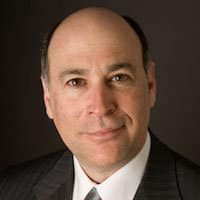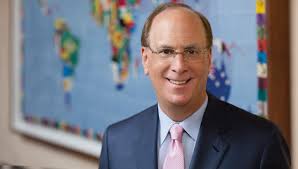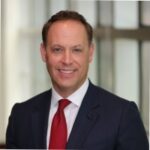BlackRock CEO says higher interest rates have changed where investors keep cash.
Laurence Fink, chairman and chief executive of BlackRock, said the current crisis of confidence in the regional banking sector will ultimately fuel another round of growth in the capital markets, which will benefit the asset manager.
Fink said on BlackRock’s results call on 14 April that the fund manager is marking the 35th anniversary of its founding and moments of dislocation and disruption have been inflection points throughout its history and led to opportunities.
“I believe the current crisis of confidence in the regional banking sector will ultimately fuel another round of growth in the capital markets,” he added. “BlackRock will be an important player, and there are going to be more opportunities for clients as people, companies and countries increasingly turn to markets to finance their retirement, their businesses and their entire economies.”
In the week following the collapse of SVB Bank, BlackRock saw significant increases in clients using Aladdin’s modelling tools as they looked to understand their exposures to specific securities, sectors and the yield curve. Fink said they also used Aladdin’s capabilities to manage interest rate risk, their portfolios and set enterprise-level broker and trade restrictions.
Similarly, wealth management clients turned to Aladdin to better understand their clients’ exposures, as they did during other significant market events such as the COVID-19 pandemic and the Russian invasion of Ukraine.
“Use of Aladdin following the failure of US regional banks more than doubled at many of our wealth platforms,” said Fink. “Aladdin was designed and built for these times.”
In addition, BlackRock was awarded a mandate by the FDIC to advise on asset sales related to the resolutions of SVB and Signature Bank.
Fink continued there has been a structural shift in the market driven by increasing interest rates and inflation and clients paying more attention to where they keep their cash balances. Alongside traditional bank deposits, clients are looking to money market funds or ultra-short bond strategies, which he expects to be a long-term trend.
“We had $40bn-plus of inflows in March, and some outflows in January and February that were a result of SPAC unwinds but we feel very good about our positioning,” said Fink. “We have a $683bn cash platform that has grown at 50% over the last five years.”
Fink believes 2023 is presenting an “incredible” opportunity for long-term investors as they can earn more yield from cash, infrastructure and private credit are offering attractive returns, bonds can be a major component in portfolios and equities have much better valuations.
“We are opening new channels for growth by scaling our alternatives franchise, expanding the market for bond exchange-traded funds and providing clients with access to emerging opportunities in transition finance,” added Fink.
Fixed income ETFs
BlackRock had net ETF inflows of $22bn in the first quarter and Fink said flows into bond ETFs were offset by outflows from precision ETFs, as clients used the latter as tactical asset allocation tools to express their attitude to risk during stressed markets.
Fink said BlackRock led the industry with $34bn in net inflows into bond ETFs in the first quarter, and represented over 60% of total fixed income ETF trading volumes during that time frame, especially as the US Treasury market experienced large and historic moves. As a result, BlackRock’s US Treasury ETF has over $180bn of assets across the entire yield curve.
“ETFs have been modernizing the bond markets by contributing real-time information about pricing and market conditions,” he added. “Notably, ETF liquidity remained strong even as the underlying market liquidity became more challenged.”
He highlighted that trading costs for iShares’ US Treasuries ETFs remained low despite trading costs increasing in the underlying bonds and that fixed income ETFs are increasingly being used for active management. The ETF flows contributed to a total $110bn of quarterly total net inflows in the first quarter.
Robert Kapito, president of BlackRock, said on the results call that there has been a “pretty remarkable” shift as, for the first time in years, investors can earn very attractive yields without taking much duration or credit risk.
 “This really is a once in a generation opportunity in fixed income,” said Kapito. “We also offer over 450 bond ETF choices which is more than five times the next largest issuer across the entire yield curve.”
“This really is a once in a generation opportunity in fixed income,” said Kapito. “We also offer over 450 bond ETF choices which is more than five times the next largest issuer across the entire yield curve.”
Kapito expects the rising interest rate environment to continue until the Federal Reserve sees the signals it is looking for with regards to inflation and growth.
“This means money will be in motion as clients build portfolios with high-performing active investments alongside ETF,” Kapito added .”It’s no longer active or index, it’s active and index and ETFs, and even when markets stabilize, fixed income is going to be back in demand in a significant way.”
Fink also expects the trend towards outsourcing of both investment management and technology to continue. He continued that in the last three years, BlackRock has won outsourcing mandates totalling $400bn in assets under management, including $200bn in the last 12 months alone.
Financials
BlackRock reported that the first quarter of this year represented 5% annualized organic asset growth and 1% organic base fee growth.
The first quarter results were the first presented by the new chief financial officer, Martin Small, who succeeded Gary Shedlin. Small was previously head of BlackRock’s U.S. wealth advisory business for the past four years. He also previously served as head of iShares in the U.S. and Canada and in leadership roles for BlackRock’s financial markets advisory unit.
Small said that in line with BlackRock’s guidance in January, headcount is expected to be broadly flat in 2023.
“We will make inorganic investments where we see an opportunity to accelerate growth and support our strategic initiatives,” Small added. “Our acquisition philosophy focuses on extending our product capabilities and our distribution reach.”
Fink also said there is an opportunity for something inorganic and transformational.
“We’re going to be prepared to do something like that, but I’ll just leave it at that,” added Fink. “I see more opportunities now for BlackRock than I have in the last few years.”
The asset manager also reported a 10% decrease in revenue year-over-year to $4.2bn, which it said was primarily driven by the impact of significantly lower markets and dollar appreciation on average assets under management and lower performance fees. Operating income also decreased 17% year-over-year to $1.5bn.
Greggory Warren, senior stock analyst for Morningstar Research Services, said in a report that BlackRock closed out March 2023 with $9.1 trillion in managed assets, up 5.8% sequentially but down 5% on a year-over-year basis.
4-star rated $BLK has underperformed the market by approx. 10% YTD.
Following Q1 #earnings, our full-year forecast continues to call for positive low- to mid-single-digit top-line growth during 2023.
Earnings review & outlook here: https://t.co/3eBh8onG9u pic.twitter.com/eD8rPQNiZ7
— Dave Sekera, Morningstar Chief Market Strategist (@MstarMarkets) April 17, 2023
“Net long-term inflows of $103bn during the quarter were slightly lower than our expectations for $107bn but still reflective of annualized organic assets under management, growth of 5.2% (just outside the upper end of our long-term annual organic AUM growth target of 3%-5%),” said Warren. “More importantly, BlackRock continues to see positive organic AUM growth from its higher fee-earning active fund platform, which provides an offset to ongoing fee compression.”


